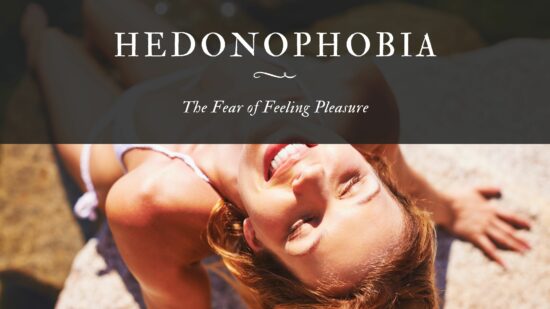Ever thought you could be scared of pleasure? Let’s find out what hedonophobia is all about. Phobia, gotten from the Greek word “Phobos,” which means “fear” or “horror,” is a common type of anxiety disorder that is characterized by irrational and intense fear towards simple things that may not be of any harm.
It is deemed absurd the kind of things people are afraid of; water, crowd, places, genitals, and so on. But maybe you have never thought that someone could be afraid of “pleasure,” it is absurd to think that one man’s food is actually another man’s poison. This type of disorder is called Hedonophobia.
Hedonophobia, gotten from the Greek words “hedone” and “phobia,” which means “pleasure” and “fear,” respectively, is defined as the persistent malady which is characterized by extreme fear towards experiencing pleasure. Sometimes, people with this disorder find it difficult to enjoy certain pleasurable events.
This condition has a kind of guilt feeling relating to pleasure or any pleasurable sensations. This could be as a result of cultural or religious background that teaches pleasure to seem unnecessary and inappropriate.
Many times, this guilt often “social guilt” is related to enjoying and having fun while acknowledging that there are some people suffering and are going through hardship. This is common in persons that are very empathic to a fault that they feel undeserving of the relatively comfortable lives that they have.
Persons that have self-esteem problems to work on may also develop this condition.
Such people may develop this condition because they have the mentality of being undeserving of pleasure because they may feel incompetent or maybe because of what they have done in the past, things that they view as “wrong,” which in turn makes them feel undeserving of anything good or pleasurable.
Causes of Hedonophobia
Like every ailment and disorder, there is a cause behind it.
This disorder is believed to develop due to certain cognitive influence that manifests as ill behaviors that are deemed extreme. These causes have been narrowed down into the following:
1. The feeling of unworthiness
When someone feels undeserving, the person feels like good things should not be wasted on them. They have this extreme feeling that they do not deserve good things in life.
This could be as a result of a rough childhood or adolescent stage where the child is guilt-tripped or made to believe that they are not good enough.
This may evolve to this condition called “hedonophobia.” People like this always find it difficult to enjoy pleasurable activities as they are persistent reminder ringing in their head that they are not good enough.
2. Religious and cultural background:
Many religious and cultural beliefs pounders on the “sacredness” of sexual activities. We all know that most sexual activities give pleasure, and pleasure is one of the main aims of indulging in sexual activities.
The teachings that come from these religions and cultures that view sexual activities as sacred often use fear in making sure that the rules and laws are kept. It is general knowledge that fear is the most used tool in enforcing rules and laws.
Therefore, religion and culture are not left out. The issue of premarital sexual intercourse relating to guilt is one of the most common reasons here.
In many cultures as well as religion, premarital sexual intercourse is highly discouraged as to these cultures and religion, sexual activities are viewed as sacred and should only be done in marriage between two formally married couples.
There is a prejudice that accompanies premarital sexual intercourse in most cultures, a young child (mostly girls) once engaged in sexual intercourse is seen as dirty and bad.
This is quite “shameful,” thus, young girls are taught not to engage in sexual intercourse and to keep their virginities. Fear is used to enforce this, and guilt is birthed when she engages in any form of sexual activity. Although many recover from this, some develop this condition.
Also, the issue of sexual orientation should not be excluded. Many cultures and religions are known to go against homosexuality, and they go as far as punishing homosexuals by death.
It is deemed shameful and evil in many cultures and religions; thus, the heavy teachings pondered on the topic as they are bent on teaching their children, including everyone, that they should be heterosexuals.
Therefore, a man who finds out that he is attracted to men or to both men and women, the intense fear of having to be treated awful, the feeling that he is possessed by some evil spirit (according to the teachings), the feeling that they are evil and the need to stop being “evil” creates overwhelming guilt and fear towards finding homosexuality “pleasurable.” This is the same for lesbians and other genders as they are likely to develop this disorder.
Although people are becoming more accepting of them, it is a real thing in some places where there is so much prejudice against them.
In religion, there are people who have sworn to be celibate, not only in sexual terms but in other terms relating to pleasure, these people are most prone to developing this disorder as they are afraid of going against their vows and would always feel guilty if they ever did.
Again, there are some religion and culture with the pure intention of teaching “selflessness” as in you should not spend an outrageous amount of money on material things such as clothes, cars, shoes, etc.
While your neighbour is in dire need of basic needs such as food, shelter, water, etc. but can barely afford them.
Teachings like this come with pure intentions but often end up instilling “guilt” in people, making them feel guilty whenever they spend money on things they like while they acknowledge that millions of people are in abject poverty and are suffering.
This makes them unable to experience pleasure in eating out, going clubbing with friends, drinking out, and so on.
3. Excessive empathy
Empathy is what makes us human. It makes us feel for people. Empathy is what makes us emotional to some extent. Being empathetic means you have a level of emotional intelligence, and it is good in helping you connect with people, in summary, we can say that it helps the social life of everyone.
But what happens when empathy is excessive. Nothing excessive is good. This may make a person develop this disorder.
Having to enjoy life where they are people that life is dealing blows upon blows on, is pure torture to these people. Someone that is empathic to a fault may develop hedonophobia would feel anxious and guilty towards pleasure and having fun.
4. The sense of low self-worth
Some people, until you convince them, do not feel that they are good enough.
These people may feel like they are incompetent or that they are not doing for the world, yet life is treating them so well.
These people feel like they are bad people, and do not merit the good things in life. These people feel like they are other, more deserving people out there that life is not being fair to.
These people feel like life is being unfair by channeling to them, so much good that was meant for people whom they believe are competent, good, and more deserving. They would feel bad and anxious, enjoying all those things while they are better people around. This is how this disorder may form.
5. Asceticism
This could be a result of religious upbringing whereby the individual adopts doctrines that teach self-denial of worldly pleasure. A person like this is most likely to develop this condition as they are afraid of worldly pleasure and what they may bring, and they feel guilty at the taste of this pleasure.
This may start as a person just focusing on being religiously pure and then end up being a disorder.
6. Background
This may not necessarily have nothing to do with religion and culture, but it has everything to do with upbringing.
Every parent wants what is best for their children; they normally have good and pure intentions for their children. Most parents acknowledge their responsibility to train their children well, giving them the best in life.
But in some cases, children are taught strong work ethics that influence their minds that they need to be worthy of good things in order to enjoy good things. Many children adopt thus, and guilt becomes their motivation to stay away from pleasure when they sense it.
This kind of person begins to view pleasure as frivolous and become unable to enjoy pleasure.
Symptoms of Hedonophobia
Symptoms of hedonophobia are known to present certain behavioral patterns that were developed over a long period of time. In persons under 18 years, it takes six months for the behavioral Patterns to develop and longer than 6 months in persons older than 18 years.
According to the root cause of this condition which carries across individuals, persons with hedonophobia when faced with pleasure or when expecting pleasure suffers persistent and intense fear
Other recognized symptoms may include the following:
- Intense fear and anxiety over pleasure
- Panic attacks
- Increased heart rate
- Persistent feeling of dread towards pleasure.
- Feeling of guilt.
- Constantly avoiding pleasure
- Inability to cope with anxiety
- Muscle tension
- Sweating
Once a person who has this condition starts finding it difficult to function normally in their social life within their educational, occupational, and other social settings, then it said to be severe.
An individual whose normal daily life is disrupted by the person’s pure intentions of avoiding experiences that are pleasurable. Sometimes, this condition can disrupt the person’s normal daily activities by just the mere expectation of pleasure, which can trigger some symptoms of this condition.
Diagnosis of hedonophobia
In diagnosing this condition, mental health workers make use of their professional skills in narrowing down a particular problem to what it is in order to avoid misdiagnosis, which can result in a waste of time and resources.
Several of the symptoms of phobias are almost identical to some other mental disorders, including physical illnesses. Symptoms may seem similar across ailment, but diagnostic criteria are used to pinpoint what the problem really is.
Diagnostic criteria serve as a reference point to which a particular ailment is narrowed down and identified. The three types of phobias, each has its own special diagnostic criteria. Although, there are some intersections.
The diagnostic criteria that are identical to all phobias include the following:
- Prevenient Anxiety: Persons with phobias are more likely to get triggered in expectation of what they fear is to come. These people do not only get anxious and afraid at the sight of what they fear; they mostly feel intense fear at the thought of what they fear most. This can help narrow down hedonophobia. When someone feels irrationally afraid of the thought of having pleasure in the future, then the person is said to be hedonophobic.
- Avoidance: Most people avoid what they find unpleasant and fearsome. If they can, they will take off at the sight of it when a person starts avoiding any event or experience that would bring pleasure all because of some irrational fear developed towards it, and then the person is said to be hedonophobic.
- Life-Limiting: This criterion indicates that the phobia is severe. When someone begins to let irrational fear towards a particular object or situation to limit their lives, the way they relate with people, the way they usually do things, and so on. Then that person is said to have been diagnosed with that particular phobia. Therefore, when someone begins to allow irrational fear towards pleasure to start getting in their way of living normally, then the person is said to be hedonophobic.
Treatments for Hedonophobia
This disorder needs to be treated once diagnosed; it is rather best to tackle this condition from its root, that is the cause.
The root cause of the condition needs to be discovered and then tackled. Once the root cause is known, Cognitive behavioral therapy (CBT) for hedonophobia is then applied as a practical approach to resolve the beliefs inculcated and the seed of fear planted in the individual’s mind that resulted in this condition.
For example, if the root cause is as a result of religious and cultural beliefs that worldly pleasure is frivolous and evil and one should stay away from pleasure, then therapy applied should target that root cause and help in behavioral modification.
Medications are normally the final step taken in the treatment of the condition, and that is m only when this condition severely disrupts the normal daily functioning of the person.
Limiting caffeine intake, exercises, and yoga practices, and being a part of a support group or program to help you cope with this condition, can be used to promote the well-being of the individual and hasten the effects of the treatments.
Many other techniques are adopted by persons with hedonophobia mask their aversion to pleasure in order to save face.






